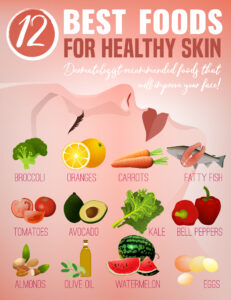 Skin Nutrition: Proven Nutrients for Beautiful Skin
Skin Nutrition: Proven Nutrients for Beautiful Skin
Soft, supple, clear-looking skin can give a woman or man a youthful glow at any age.
There are certain natural vitamins and nutrients that have been tested recently for their healthy benefits to the skin.
Before we discuss these, let’s take a look at some of the factors that can cause skin dryness, wrinkles, blemishes and spots.
You may have heard the term “free radicals” in the nutritional news lately. These are highly reactive, damaging molecules in the body that have lost one of their electrons and become unbalanced. In order to obtain the missing electron, they attack other molecules and modify their chemical structure.
This can create a chain reaction that in essence causes our bodies to rust from the inside out. Essentially, this is a form of oxidation where oxygen has combined with other substances to create a harmful shortage of electrons.
Free radicals play a major role in the aging process, including our skin, and they also contribute to many degenerative diseases such as arthritis, heart disease and cancer.
Free radicals come from pollution, smoke, overexposure to the sun, medications and drugs, infection, stress, toxic chemicals, a poor diet, and also as a byproduct of normal metabolism. Antioxidants such as Vitamins C, E, and A, can help to defend the body against free radicals and repair the damage.
Vitamin C, also called ascorbic acid, is a great promoter of youthfulness and beautiful skin. Because this antioxidant isn’t produced in the body, we must get it from citrus fruits, deeply pigmented vegetables and supplements to maintain healthy levels. Most vitamin C creams perform as antioxidant formulas that protect the skin from damaging free radicals that can lead to wrinkles and prematurely aging skin.
One study showed that topical antioxidants applied to the arms and face reduced lines and wrinkles and also improved skin thickness and elasticity (1).
Vitamin C can also benefit your skin by stimulating the growth of new collagen tissue (the protein fibers that make up connective tissues), which ultimately makes the skin appear smoother and firmer because it’s better supported by strong collagen underneath. Vitamin C products should be used for at least eight weeks to see a difference in your skin.
The Journal of the American Academy of Dermatology also published a study that showed vitamin C reduces the formation of melanin, which is responsible for the dark pigmentation of the skin (2). Therefore using vitamin C creams can lighten the skin and dark spots. There is also an added advantage in that they don’t bleach your skin like skin-lightening chemical formulas, which can be toxic.
Vitamins A and E can are also beneficial for skin nutrition. In one research study, various skin creams containing 5 percent vitamin A (in the form of retinyl palmitate) and 10 percent vitamin E (in the form of alpha-tocopheral acetate) were shown to increase skin moisturization and cellular renewal and to decrease skin wrinkling (3).
Alpha Lipoic Acid (ALA) is known as the ‘Universal Antioxidant.” It is made in small amounts in the body. ALA acts as a powerful antioxidant and as a scavenger of both water and fat-soluble free radicals. It spares levels of other antioxidants such as Vitamin C and E, which are naturally present in cells and works to increase their levels.
This ability of ALA to be soluble in both water and fat, is what enables ALA to be rapidly available to skin cells as skin nutrition. Use of ALA on the skin helps to promote and develop a supple, youthful and glowing appearance (4).
Make good use of antioxidants for beautiful skin!
References:
1. Skin & Allergy News, Sept. 1999 “Sunscreen May Be Enhanced By Addition of Topical Antioxidants”
2.Journal of the American Academy of Dermatology, Jan. 1996
3. Cosmetology Toil 1999 “Retinyl palmitate at 5 percent in a cream: its stability, efficacy and effect”
4. Skin and Aging, May 1988 “Topical Alpha Lipoic Acid for Anti-Aging Skin”


